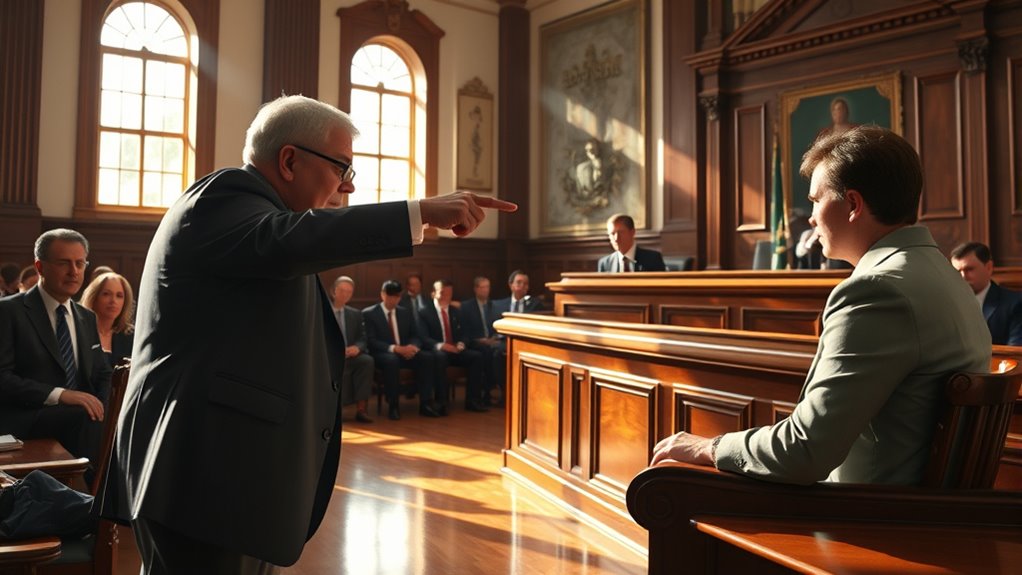When facing false allegations in court, it’s crucial to respond strategically. Gather solid evidence like alibis, documentation, or surveillance footage to support your innocence. Stay calm and avoid emotional reactions, as they can be used against you. Work with a skilled attorney to develop a clear narrative that challenges false claims and anticipates prosecution tactics. Proper documentation and composed courtroom behavior are essential. To learn more effective ways to protect your reputation and advance your case, keep exploring the steps involved.
Key Takeaways
- Develop a strategic legal response by gathering evidence, witnesses, and expert support to counter false allegations effectively.
- Present a clear, factual narrative using alibis, surveillance footage, and documentation to cast doubt on accusations.
- Maintain calm and professional courtroom behavior to prevent emotional reactions from undermining your defense.
- Act promptly to mitigate legal penalties and reputational damage, including exploring defamation claims if applicable.
- Keep detailed records of interactions and evidence to support your case and challenge false statements confidently.

Have you ever faced false allegations in court? If so, you know how overwhelming and stressful it can be. False accusations can threaten your reputation, disrupt your life, and lead to serious legal consequences if not handled properly. The first step is understanding that your response needs to be strategic. You can’t simply deny or ignore the allegations; you must develop effective defense strategies that address the specific charges and circumstances. This involves gathering evidence, identifying witnesses, and possibly working with expert witnesses who can support your case. It’s crucial to remain calm and composed during the process, as emotional reactions can sometimes be used against you.
Responding strategically to false allegations is crucial to protect your reputation and legal standing.
When preparing your defense, consider the importance of presenting a clear narrative that counters the false allegations with factual evidence. This might include alibis, surveillance footage, or documentation that proves your innocence. Your goal is to create a compelling case that casts doubt on the credibility of the accusations. It’s equally important to anticipate the prosecution’s tactics and be ready to challenge any inconsistencies or false statements they present. Having a skilled attorney by your side can make a significant difference here, as they know how to steer through complex courtroom procedures and employ legal strategies tailored to your situation.
Addressing false allegations also involves understanding the potential legal consequences if you’re found guilty. These can range from fines and probation to imprisonment, depending on the severity of the charges. However, even if you’re acquitted, the damage to your reputation can be long-lasting. That’s why it’s critical to act swiftly and decisively. Your lawyer can help you explore options such as filing a defamation claim if the false allegations have harmed your reputation publicly.
Throughout the process, it’s essential to maintain your composure and avoid behaviors that could be misconstrued or used against you. Keep detailed records of all interactions and evidence related to your case. This documentation could be invaluable in refuting false claims and demonstrating your innocence. Remember, the key is to attack the allegations with facts and legal strategies that underscore your innocence while protecting your rights. False allegations are a serious matter, but with the right approach and a capable legal team, you can effectively respond and mitigate the damage. Your proactive response can make all the difference in steering through the complexities of the legal system and emerging with your reputation intact.
Additionally, understanding the importance of projector technology like contrast ratio and color accuracy can help you better evaluate evidence or visual presentations in your case, ensuring clarity and precision in court.
Frequently Asked Questions
Can False Allegations Lead to Criminal Charges Against the Accuser?
False allegations can indeed lead to criminal charges against the accuser, especially if they intentionally lie or file malicious claims. Legal consequences include charges like perjury or filing a false report, which can result in fines or jail time. You should also be aware that false accusations cause reputational damage to the accused and the accuser, and pursuing legal action can help protect your reputation and seek justice.
How Long Does It Typically Take to Resolve a False Allegation Case?
The case duration for resolving a false allegation varies, but it generally takes several months to over a year. Legal procedures, including investigation, evidence gathering, and court hearings, influence the timeline. You’ll want to stay patient and proactive, providing your attorney with all necessary information promptly. The length depends on case complexity, court schedules, and whether there are any delays, but understanding these factors helps you prepare for an eventual resolution.
Are There Specific Laws Protecting Against False Accusations in Court?
Yes, there are legal protections against false accusations. You’re protected by false accusation statutes that hold people accountable if they knowingly make false claims. These laws aim to deter false allegations and provide remedies if you’re falsely accused. You should know your rights and consult an attorney to guarantee these protections are properly applied in your case, helping you defend yourself legally and seek justice.
What Evidence Is Most Effective When Disproving False Allegations?
Think of evidence like a sturdy bridge that leads the court to the truth. To disprove false allegations, you need evidence with high credibility, such as clear documents or digital records, and strong witness testimony that can confirm your story. Presenting consistent, verifiable facts makes your case unbreakable. When your evidence is credible and your witnesses are reliable, you’ll build a compelling bridge back to your innocence.
Can a False Allegation Impact My Reputation Permanently?
Yes, a false allegation can cause permanent reputation damage and emotional distress. Even if you prove the claim false, lingering doubts may affect how others perceive you. The emotional toll can be significant, leading to stress, anxiety, and social withdrawal. To protect yourself, consider gathering strong evidence, seeking legal advice, and addressing the issue promptly. Taking these steps helps minimize long-term harm to your reputation and mental well-being.
Conclusion
When you face false allegations in court, stay calm, gather evidence, and present your case clearly. When you stay composed, when you provide proof, when you speak truthfully, you strengthen your position. Remember, your honesty, your consistency, and your determination can turn the tide. By standing firm, by staying prepared, and by believing in your innocence, you not only defend yourself but also reclaim your peace of mind and your reputation.










